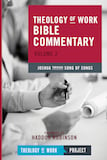God’s Blessing is Redoubled When People Work According to His Ways (Ruth 3:1-4:18)
Bible Commentary / Produced by TOW Project
In the remarkable episode of Ruth gleaning in Boaz’s field, we see a vivid demonstration of Boaz’s compassion, generosity, and ethnic tolerance. This raises the questions, Why was Boaz’s heart so soft toward Ruth, and why would he create this environment where anyone, even an alien Moabite woman, would feel at home? According to Boaz’s own testimony Ruth embodied nobility and faithfulness to the true God (Ruth 3:10–11). As a result, he wished her to “have a full reward from the Lord, the God of Israel, under whose wings you have come for refuge” (Ruth 2:12). Born in Moab, she had nonetheless turned to the God of Israel for salvation (Ruth 1:16). Boaz recognized God’s wings over her and was eager to be the instrument of God’s blessing for her. By caring for a destitute foreigner, he honored the God of Israel. In the words of the Israelite proverb: “Those who oppress the poor insult their Maker, but those who are kind to the needy honor him” (Proverbs 14:31; see also Proverbs 17:5). The apostle Paul expressed this theme centuries later, “Whenever we have an opportunity, let us work for the good of all, and especially for those of the family of faith” (Galatians 6:10)
As the story progressed, Boaz began to see Ruth as more than an industrious worker and faithful daughter-in-law to Naomi. In time he spread the wings of his garment over Ruth (Ruth 3:9)—an apt metaphor for marriage, mirroring the love and commitment represented by the wings of God. There is a work-related aspect to this love story, for there is real estate involved. Naomi still has some claim to the land that belonged to her late husband, and according to Israelite Law, his next-of-kin had the right to acquire the land and keep it in the family by marrying Naomi. Boaz, whom Naomi has mentioned was a kinsman of her husband (Ruth 2:1), was actually second in line to this right. He informs the man who is next-of-kin of his right, but when the man learns that claiming the land means he must also bring the Moabite Ruth into his household, he repudiates the right (Ruth 4:1-6).
Boaz, in contrast, was pleased to be chosen by God to show favor to this woman, despite her being considered racially, economically, and socially inferior (Ruth 4:1–12). He exercises his right to redeem the property, not by wedding the elderly Naomi in a marriage of convenience, but with Naomi’s permission by marrying Ruth in a match of love and respect. By marrying this Moabite woman, he fulfills in his own way a bit of God’s promise to Abraham that “by your offspring shall all the nations of the earth gain blessing” (Genesis 22:18). He also gains yet more property, which we may assume he manages as productively and generously as the property he already owned, foreshadowing Christ’s words that “to those who have, more will be given” (Mark 4:25). As we will soon learn, it is entirely apt that Boaz should serve as a forerunner to Jesus. Along the way, the events of the story reveal still more about how God is at work in the world for good.







